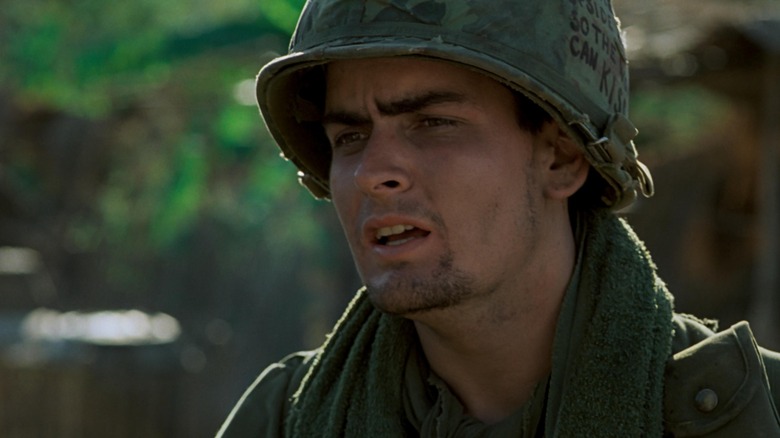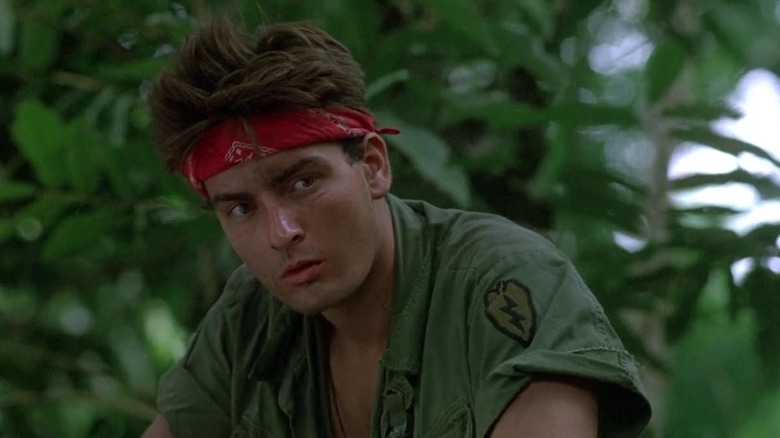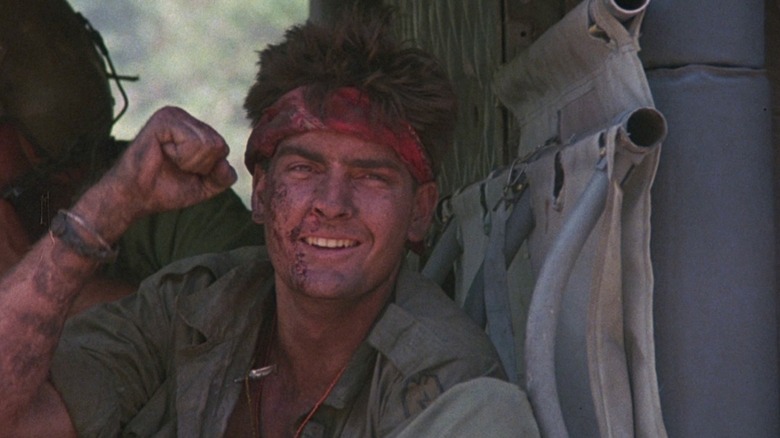Oliver Stone's Tough Platoon Shoot Almost Made Charlie Sheen Walk Away
Chances are if you've seen an American war film in the last 30 years, the name Dale Dye might ring a bell. Dye is a former Marine captain whose brief cameos and appearances are peppered throughout action films like "Under Siege," "Mission: Impossible," "Starship Troopers," and "Saving Private Ryan." After his first onscreen appearance in Tobe Hooper's "Invaders from Mars," Dye played Captain Harris in Oliver Stone's semi-autobiographical war epic "Platoon." The concept of actor boot camps is nothing new, and the intense soldier training that goes on at these grueling sessions does tend to bond the players together. The experience can also add some verisimilitude that pays respect to the actual soldiers that had to go through actual boot camp. Dale Dye's actor boot camps are legendary in the business. Apparently, the one that Charlie Sheen and the other actors went through during the making of "Platoon" in 1986 was particularly brutal.
It didn't help matters that Stone already had a reputation for putting his actors through hell, especially early on in his directing career. Michael Douglas in a Vanity Fair interview, for example, told an anecdote where Stone accused him of being on drugs when they were making "Wall Street" together. The mind games Stone played caused Douglas to imbue the role of Gordon Gekko with even more nastiness and anger, leading to an eventual Best Actor Oscar.
During "Platoon," Charlie Sheen also told Vanity Fair that the two-week boot camp went way too far, forcing the actors to "live in the same clothes with no showers, no phone calls to agents, no letters to girlfriends ... it was hell." Stone's abuse would carry on throughout filming to the point where Sheen and the other actors almost went from tired thespians to fed-up mutineers.
Charlie Sheen was a nerd
"Platoon" became a huge hit in 1987 grossing over $130 million dollars and was nominated for eight Academy Awards, winning four including Best Picture and Best Director for Stone. In a fantastic tell-all cover story in the March 1987 issue of People magazine, Stone teased Sheen saying, "When he arrived for filming, Charlie was still a nerd. Then each week there was a perceptible change as he became a soldier." The grunt training that eventually transformed the actors into competent Army men was "100% military," according to Sheen who said the cast was basically threatened. "We were told if we disobeyed an order, we'd be off the film."
Regardless of whether the actors were soft or not, they didn't last very long. "I think it was day two when me, Kevin Dillon and Francesco Quinn got together and said, 'We're actors, not infantry. Let's just walk.'" Stone even openly berated Sheen during one scene where his character Chris Taylor has to help unload a helicopter without his shirt on. The "Huey" chopper was kicking up rocks and debris, but Stone didn't care. According to Sheen, Stone asked, "Are you a little pu**y from Malibu? Played too much volleyball all your life?"
Charlie Sheen was not having it. "I got so pissed off I ripped the shirt off, did the scene and had scars on my back for weeks," he recalled. So, Stone still got the shot he wanted in the end.
True to life
The People magazine interview took place during the height of the film's success when "Platoon" was still raking in cash in theaters. Sheen was proud of the realism in the movie, and also seemed to reference the ongoing military presence of the United States in El Salvador and Nicaragua that was occurring at the time.
"The Vietnam War was something that never should have happened. I'm hoping guys my age can see this film and not want to perpetrate a similar situation in, say, Central America. If we can achieve that, then we've said something with the movie."
The effects of the war were still being felt in the '80s and continued to influence Stone for years to come. His so-called Vietnam trilogy of "Platoon," "Born on the Fourth of July" and "Heaven and Earth" are staunch anti-war films. "Born on the Fourth of July" was based on the life of activist Ron Kovic and "Heaven and Earth" was also loosely based on a true story, leaving "Platoon" to depict Stone's actual experiences during the war. Perhaps that's why he was so hard on the troops.
Stone enlisted in April of 1967 and immediately requested combat duty in South Vietnam. He was assigned to 2nd Platoon, Bravo Company, 3rd Battalion, 25th Infantry, and was stationed near the Cambodian border. He received the Bronze Star Medal for valor, and went on to document his own story even further with his autobiographical novel "Chasing the Light: Writing, Directing, and Surviving 'Platoon,' 'Midnight Express,' 'Scarface,' 'Salvador,' and the Movie Game."


